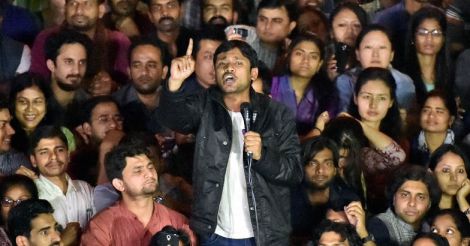Weeks after the stormy events in Jawaharlal Nehru University, which led to a police crackdown and sedition charges against student union leader Kanhaiah Kumar and others, political parties are debating the wider impact the issue had on citizens and voters.
The perceptions of Modi government, the BJP and the Rashtriya Swayamsevak Sangh are diametrically opposite to that of its political opponents like Congress and Left parties.
Home Minister Rajnath Singh, who made a stern remark against the demonstrations in support of Afzal Guru, had asked Delhi police, which reports to him, to be tough with the sloganeers. There was no place for anti-national activities on the campus, he said. Singh also did not respond to demands for strict action against the then Delhi Police Commissioner B.S.Bassi, who had ordered officers to remain mute spectators when Kanhaiah as well as journalists were roughed up by BJP sympathisers in the Patiala House court.
But Singh kept silent after it was exposed that he had relied on a fake Tweet attributed to a Lashkar-e-Taiba for his stance.
The BJP is of the view that it can reap electoral dividends from the controversy. Human Resources Development minister Smriti Irani then ordered all universities and schools controlled by the central government to raise massive flag posts with the tricolor fluttering.
The Sangh Parivar thinks that it has won the battle for the identification of the national flag.
The RSS, in its annual conclave, told the ABVP, the students wing of the BJP, to continue the campaign against "anti national students” in all universities, justifying the strident stance taken by ABVP in Hyderabad's central university, where suspended Dalit student Rohit Vemmula committed suicide.
It also backed the 'crackdown' on demonstrators in JNU. While Modi and Rajnath Singh have maintained silence, the government's chief spokesperson Arun Jaitley has said the issue had forced the opposition to give up its soft attitude towards those who disrespected the Indian nation.
He pointed out how even Kanhaiah Kumar, after a stint in Delhi's Tihar jail, had come out and sworn by the national flag.
BJP president Amit Shah, who had masterminded the polarised campaigning during 2014 Lok Sabha elections in western Uttar Pradesh, has asked the party cadres to defend the Sangh Parivar stance against Kanhaiah and other demonstrators of JNU.
The calculation of Shah and Jaitley is that the incidents and the speeches in JNU have only rekindled a strong patriotic sentiment in Hindi heartland, which would benefit the BJP.
On the other hand the Congress and CPM are vigorously campaigning that Kanhaiah's release ordered by the Delhi High Court and the evidence that the video showing Kanhaiah shouting anti national slogans was a doctored one, have caused irreparable damage to the credibility of the Centre and the Sangh Parivar.
Congress vice president Rahul Gandhi, CPM general secretary Sitaram Yechury, Delhi Chief Minister Arvind Kejriwal, CPI leader D. Raja and Trinamool Congress leader Derek O'Brein had taken the lead in protesting against the police crackdown in JNU and also the assault on Kanhaiah and mediapersons in Patiala House complex.
These parties insist that the double standards of the BJP and the anti-student bias of the Narendra Modi government have alienated the prime minister and his party not only from youth, but from the silent majority.
They feel that the BJP would face a rude shock not only in Assembly polls to five states this year, but also in Uttar Pradesh, Uttarakhand, Gujarat, Punjab and Goa assembly elections slated for 2017.
Interestingly the regional parties of Uttar Pradesh are much more circumspect in commenting on the JNU incidents.
The ruling Samajwadi Party has been mum on the issue.
Its supremo Mulayam has asked party leaders to asses the sentiment of voters, especially those who had shifted loyalties from other parties to support Narendra Modi, which had helped the latter garner 73 out of 80 seats for NDA in 2014 Lok Sabha polls.
The Bahujan Samaj Party, which, despite getting more than a crore votes failed to win even a single Lok Sabha seat, is carefully moderating its response. The BSP line of thought is that highlighting the suicide of Rohit Vemmula was a far more emotive issue for its voters.

























 Kanhaiya kumar addressing a gathering at JNU campus (file photo)
Kanhaiya kumar addressing a gathering at JNU campus (file photo)